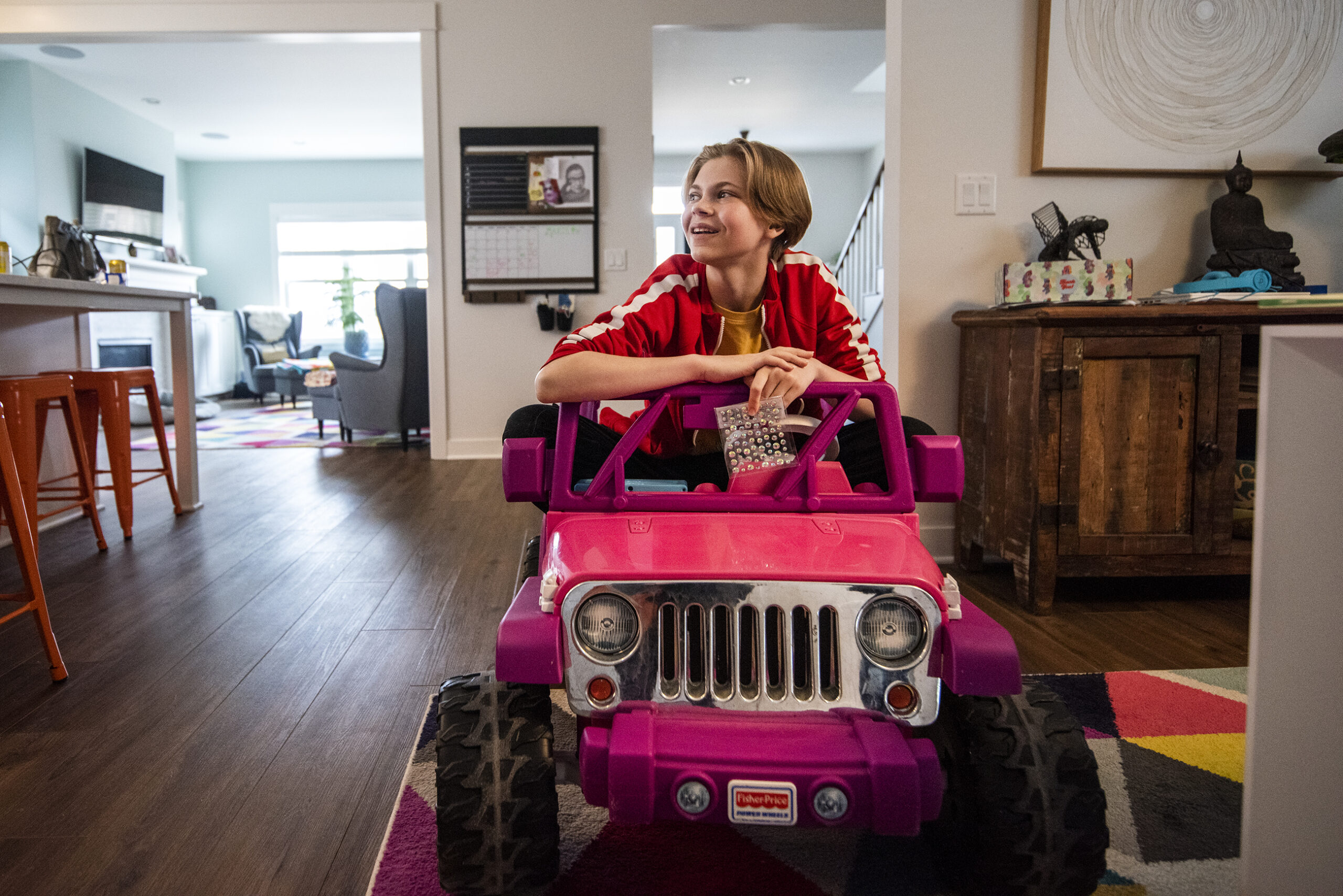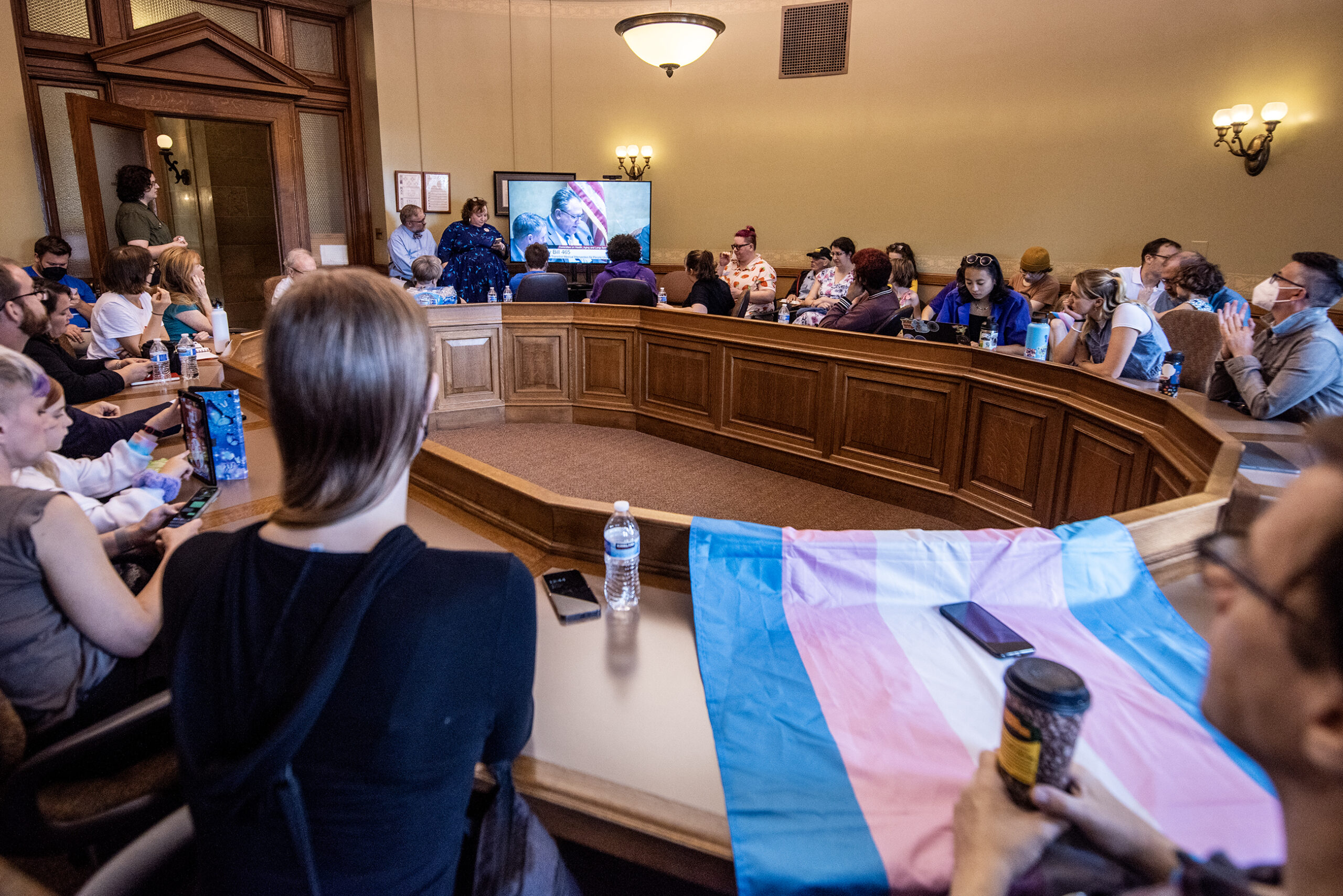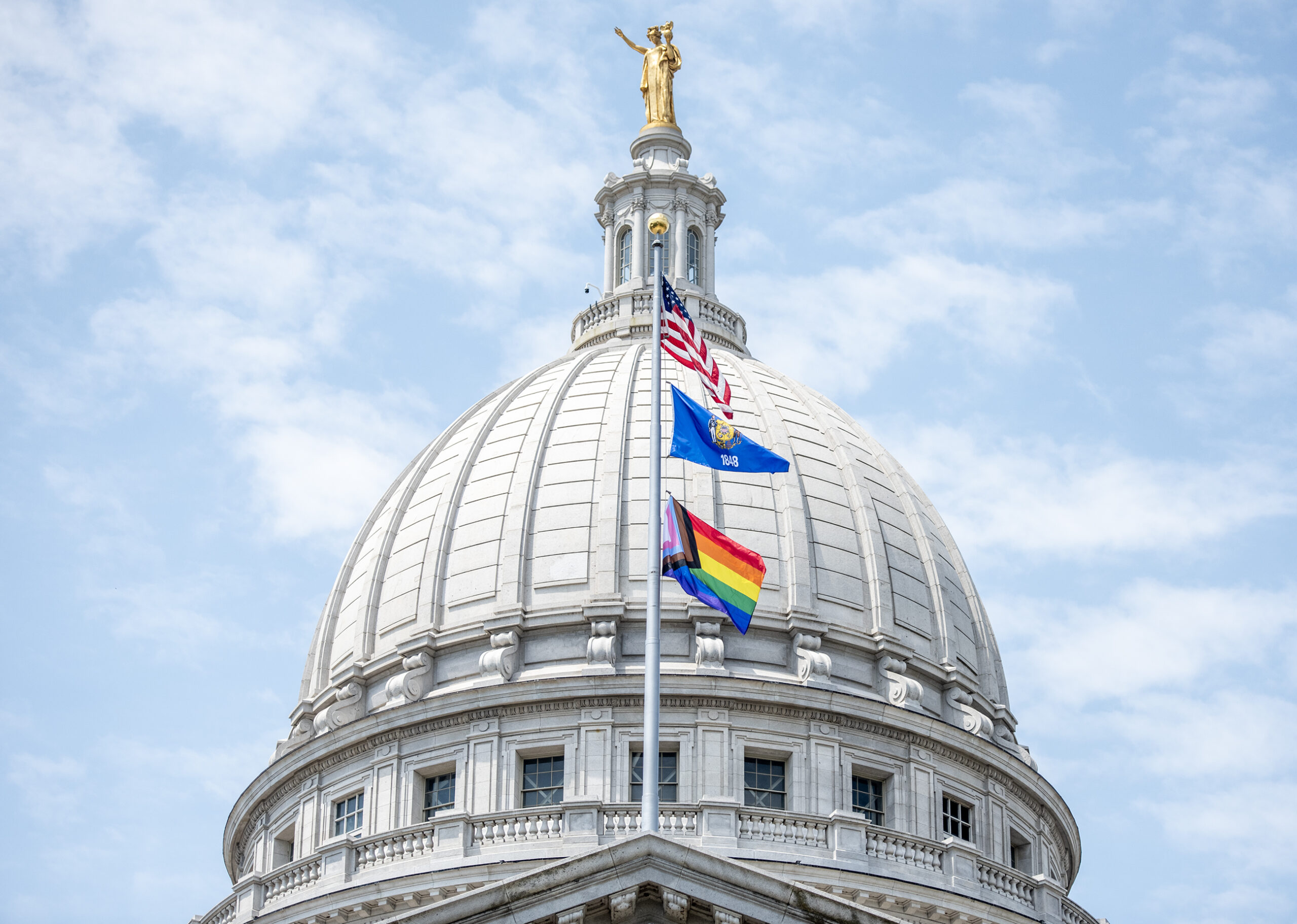Bailey Mosling considers himself Wisconsin’s premier drag teen.
At home on a recent Friday afternoon, he showed off a pink motorized toy truck he’s decorating to use for his 16th birthday drag show later this month. On stage, he goes by the name of Nemo.
“My performances are thought out and have a storyline and are very theatrical at some points,” Bailey said. “It’s just like a way to express myself, and then it’s just an art form for me.”
News with a little more humanity
WPR’s “Wisconsin Today” newsletter keeps you connected to the state you love without feeling overwhelmed. No paywall. No agenda. No corporate filter.
Offstage, Bailey is like many other people his age. He lives in Middleton with his mother, Dana; father, Luke; and older brother, Logan.
Bailey said growing up is hard enough, but as one of the estimated 150,000 transgender teenagers in the United States, he faces challenges many other teens don’t.
“It’s an interesting thing to have my rights and my identity be up for debate,” he told Wisconsin Public Radio’s WHYsconsin, which asked transgender minors and their guardians about bills that would limit the rights of transgender people.
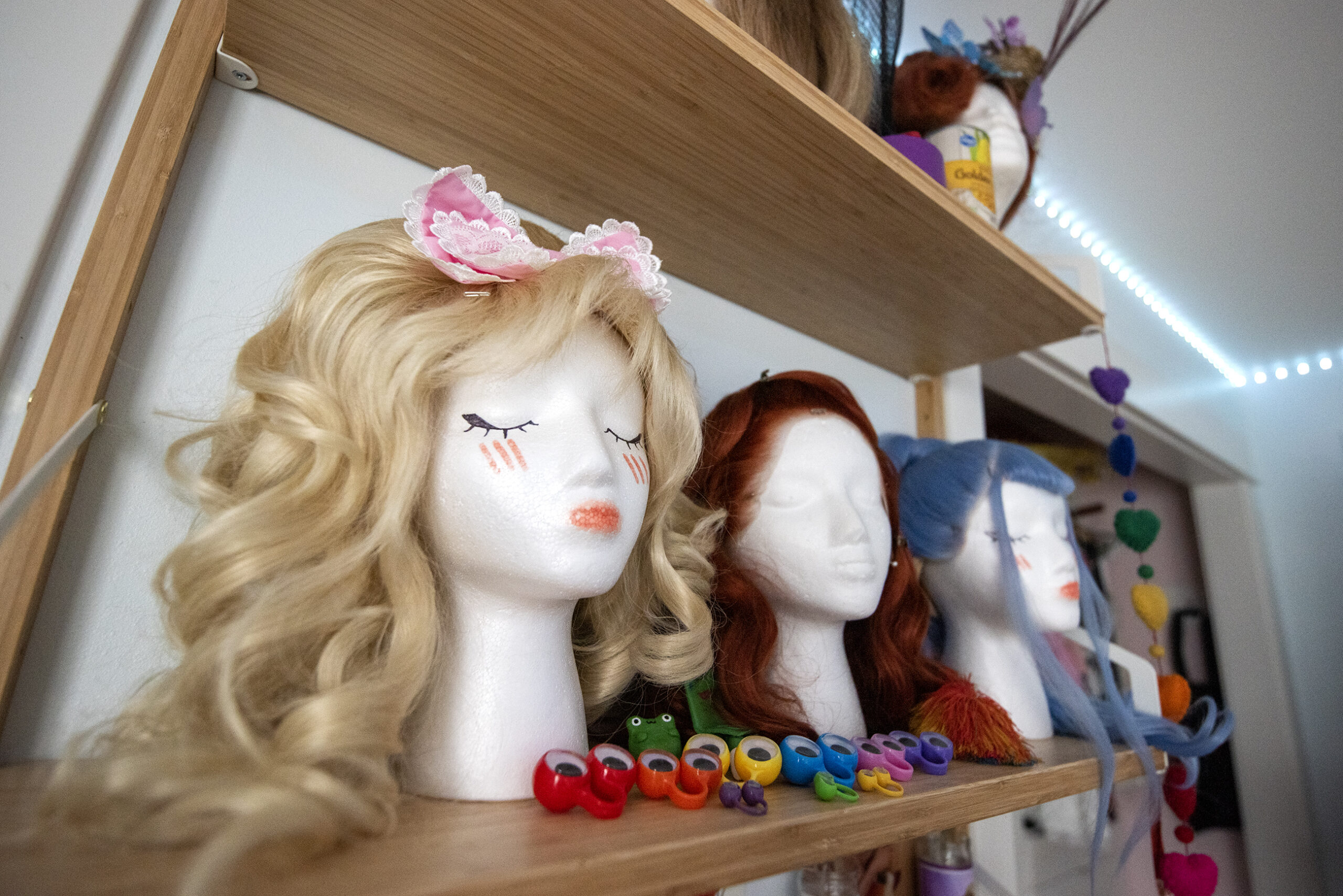
In the last year, Republicans in the Wisconsin Legislature introduced multiple bills that would have sweeping effects on the lives of transgender children. According to the LGBTQ advocacy group Freedom For All Americans, more than 100 bills that would negatively affect transgender youth have been introduced in state legislatures across the country since January.
Wisconsin’s proposals stand little chance of becoming law with Democratic Gov. Tony Evers in office, but transgender youth such as Bailey are still feeling an impact from the conversations surrounding the bills.
Wisconsin Republicans introduced a bill in February that sought to ban minors from obtaining any sort of gender-affirming care, including taking medication that delays the onset of puberty and hormones like estrogen or testosterone.
That bill was introduced a few weeks after Bailey started hormone therapy.
“I was like, ‘Oh my God, I spent all this time just for it to be taken away from me.’ And so I was scared,” Bailey said, while sitting in his living room surrounded by his family.
‘Can you read this?’
Bailey first found the language to describe himself in a book he read in sixth grade about a genderfluid teenager.
“One minute after I finished it, I went back to the first page and started reading it again,” Bailey, who is now a sophomore, said. “After I read it again, I remember putting it on my mom’s pillow or something, and saying, ‘Can you read this?’”
Bailey started to socially transition in seventh grade, which included changing his hairstyle. When he transferred to a different school in eighth grade, he changed his name and pronouns.
It took about a year to start on puberty blockers, he said. Two years later, he started testosterone.
“When it got to the point where I knew my hormone blocker could stop working any day, then it was a bit like, ‘OK, let’s speed up the process, everyone,’” Bailey said.
Bailey’s mother, Dana, helped him navigate the many hurdles to getting gender-affirming care for minors.
“There’s a reason that it takes that long,” Dana said. “A lot of it is making sure that you have the correct providers that you can have those kinds of relationships with.”
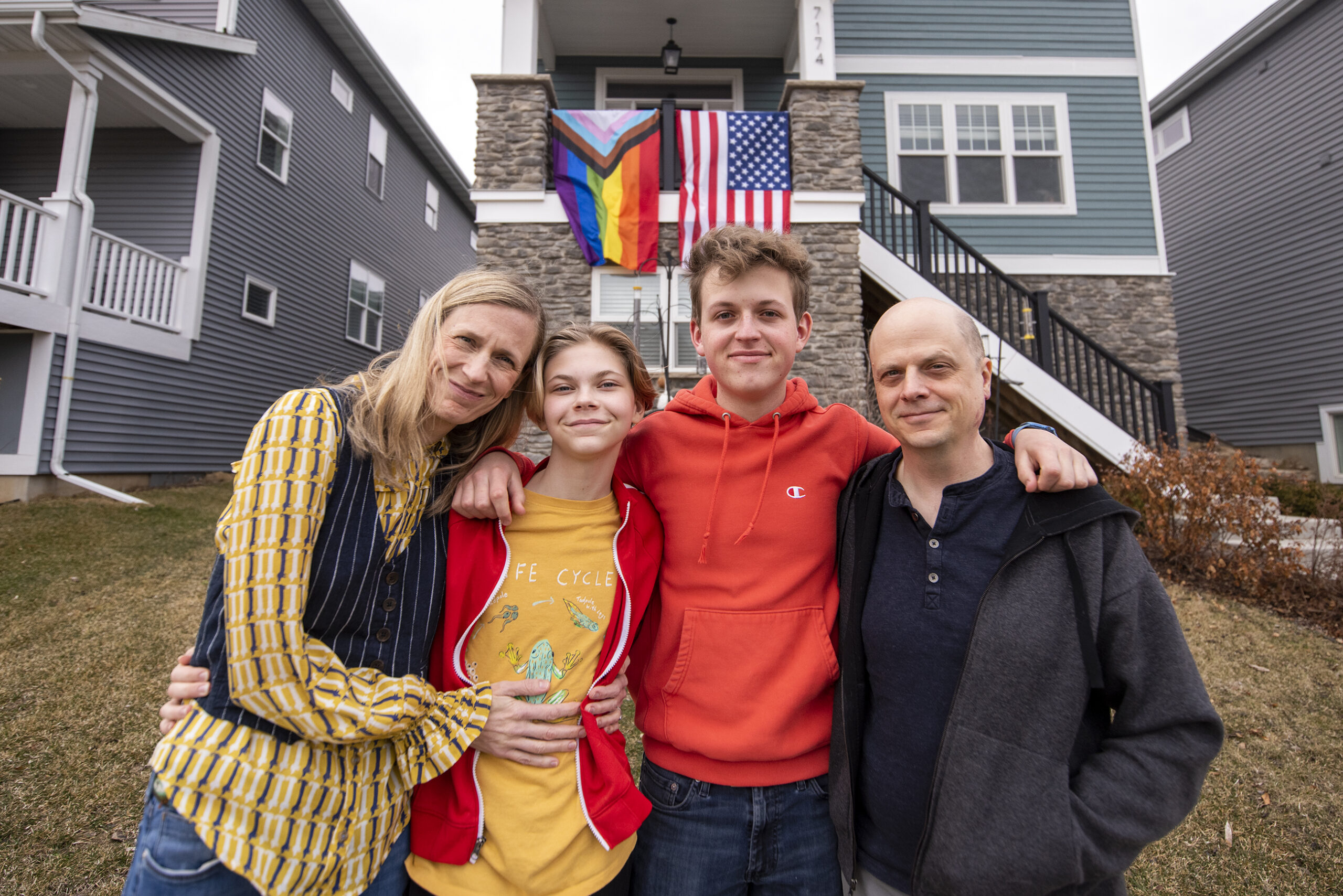
Dana believes Bailey now knows more about himself than many people his age, which she thinks is freeing for him.
“There’s no longer this insane need for discovery or figuring things out, and you can then just unfold and exist,” Dana said. “Exist and unfold and develop into the human you are going to be.”
But now, she said, politics is getting in the way of that.
“The fact that our kids’ existence is this political debate right now, I mean, that’s a stressor that most families never even have to deal with,” Dana said.
Dana said the family would be willing to move to another state to keep Bailey’s care going.
“It would be devastating to move,” Dana said. “The safety and well-being of Bailey would be more important than where we lived, that’s for sure.”
‘The right thing to do’
Michelle Baade of Beaver Dam also wonders what a future in Wisconsin looks like for her family.
She has four children, including Savannah, a 7-year-old trans girl.
“Kids know who they are in the same way that we did when we were a kid,” Michelle said. “I feel like we should give the same honor and respect to trans people when they tell us who they are.”
Michelle said Savannah was telling the family consistently she was a girl by the age of 3 and a half.
“She just got more and more adamant until she was screaming it at us,” Michelle said. “I finally said, ‘There’s something more going on. She should not be screaming at us like this.’”
Eventually, they went to a therapist in search of answers.
“We said, ‘Here’s all the things that are happening, and we just want to know what signs we’re looking for that she might be trans,’ and she said, ‘Oh, you have them all,’” Michelle recalled. “I just said, ‘I’m done not listening to her.’”
At Savannah’s age, transition is a matter of clothes, hair clips and pronouns, Michelle said, there are no surgeries and no medication is involved.
“You don’t do anything to a trans child,” Michelle said. “You just change their pronouns if they want, and you get them clothes if they want, then you honor what they want to do with their hair.”
Savannah became larger than life after those changes, Michelle said.
“There’s never been a point where we looked back and said, ‘Oh, I wonder if we did the right thing?’” Michelle said. “There was never a question of that. Her personality has come out so much that we are 100 percent sure that that was the right thing to do, and she’s never questioned it either.”
Michelle said Savannah loves sports and wants to play on a girls’ team. Bills that passed the Wisconsin Assembly last year would keep Savannah and other trans girls from playing on girls’ and women’s sports teams in the state’s schools and colleges.
“I don’t ever want to think my kid isn’t going to get to play just because of who she is, but my guess is in the climate that we live in — in the small conservative town we live in — at some point, it’s going to be a problem,” Michelle said. “The more that these bills come out, and the more hatred and ignorance that floats around about trans kids, the more likely it is that someone’s going to have a problem with her playing.”
Michelle said it creates an environment that’s emotionally exhausting
“I honestly don’t believe that there are more haters than there are supporters, I just think the haters are a lot louder,” Michelle said. “Our power is in our numbers, we just have to stop being afraid to offend anyone and come forward.”
‘This is about a child’
José from Eau Claire is the parent of a 6-year-old transgender child. WPR is not using José’s full name to protect the identity of his daughter.
José said his child came to terms with her identity during the COVID-19 pandemic.
“I think being home and having a really safe environment to practice her identity was really important,” José said. “It was really important for us, as like a family, to really be involved with it and really kind of learn how to be affirming.”
José said his family’s relationship with the broader community has been positive.
“Being a trans family has been just really transformative,” José said.
He called the bill criminalizing gender-affirming care “demonic.”
“This isn’t about debating something in a town hall,” José said. “This isn’t something about a statue, this isn’t something about a book … Those are all important, absolutely, but this is about a child.”
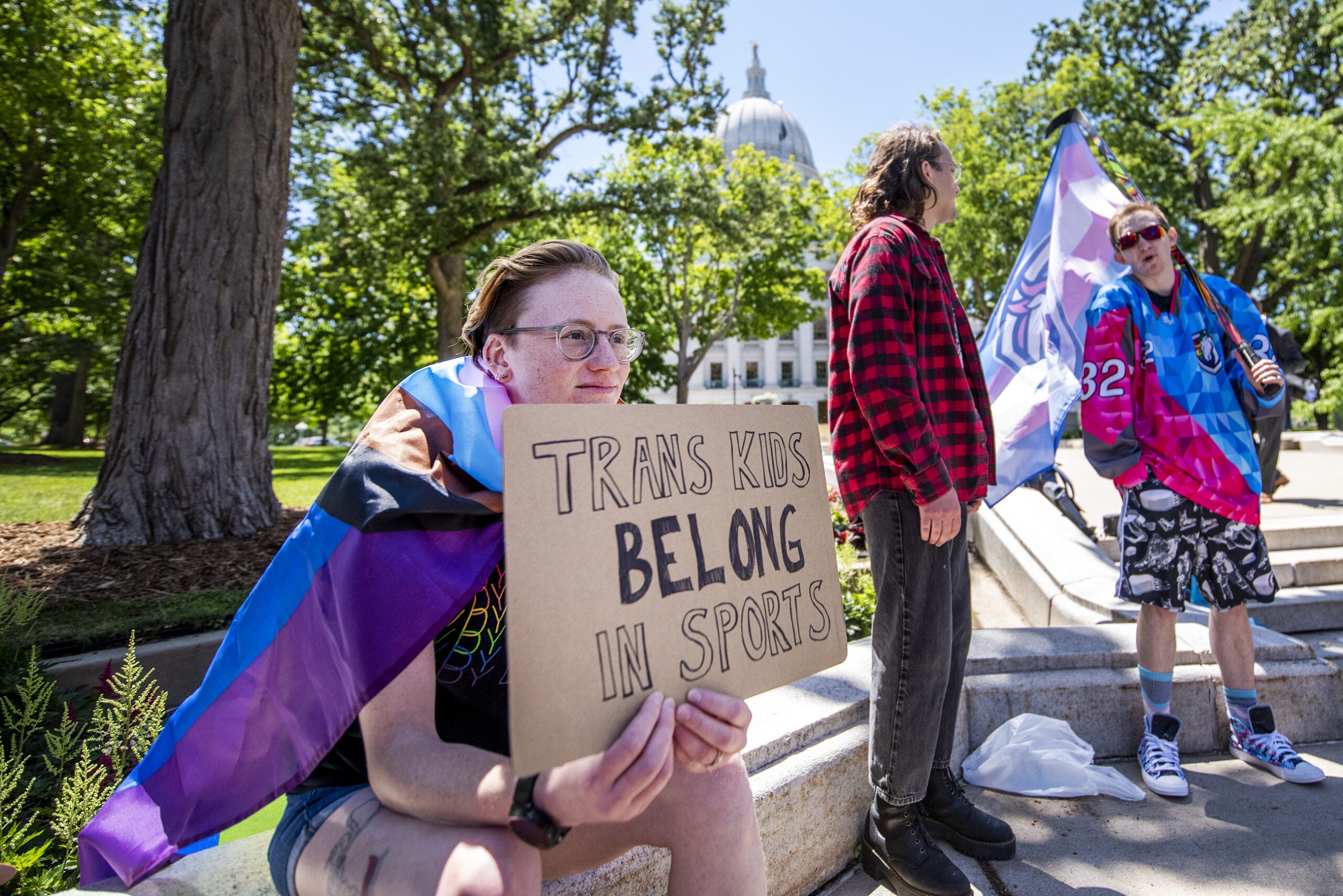
Trans-inclusive and gender-affirming policies have also come under scrutiny at the local level.
The Wisconsin Institute for Law and Liberty, a conservative legal nonprofit, is suing the Madison and Kettle Moraine school districts over policies that encourage teachers to use their students’ preferred pronouns without first obtaining parental permission, and Eau Claire’s school board president received death threats over a similar policy in that district.
National efforts to remove books with LGBTQ content from school libraries have also reached some Wisconsin schools.
José said it’s frightening taking a risk to be heard on an issue where his daughter has already become a target.
“You don’t want to draw that kind of violent attention on your house, but how else will you be heard?” José said. “As a parent, you’re always working against that personal impulse to bring it all down, to protect your child, to protect that person and to see them as a person.”
‘Just too morally distressing’
Anne Marsh serves in the Department of Pediatrics at the University of Wisconsin-Madison’s School of Medicine and Public Health. Her 8-year-old son Ryan is transgender.
“Our son has grown up in a household where from the day he shared with us who he is, he has faced nothing but unconditional love and welcoming and celebration of who he is,” Anne said. “How do you teach a child that the world is going to perceive them differently and treat them differently? It’s a hard conversation to have with a young child as a parent.”
Anne said she would resign from her position and move her family of five people if the gender-affirming care bill passed.
“It’s just too morally distressing to me to go to work every day and provide evidence-based quality care to the children of Wisconsin in my line of work and know that my child won’t have access to that same degree of care,” Anne said.
She said the various bills revolving around trans children are “born of ignorance.”
“If you actually sit down and you talk to people who are gender expansive or transgender and truly listen to their stories … That’s how people’s hearts and minds get changed about this,” Anne said. “When we create a culture where it’s not safe to do that, where you have to worry about your physical well-being or you have to worry about your emotional well-being, it’s hard for people to stand up and tell their stories.”
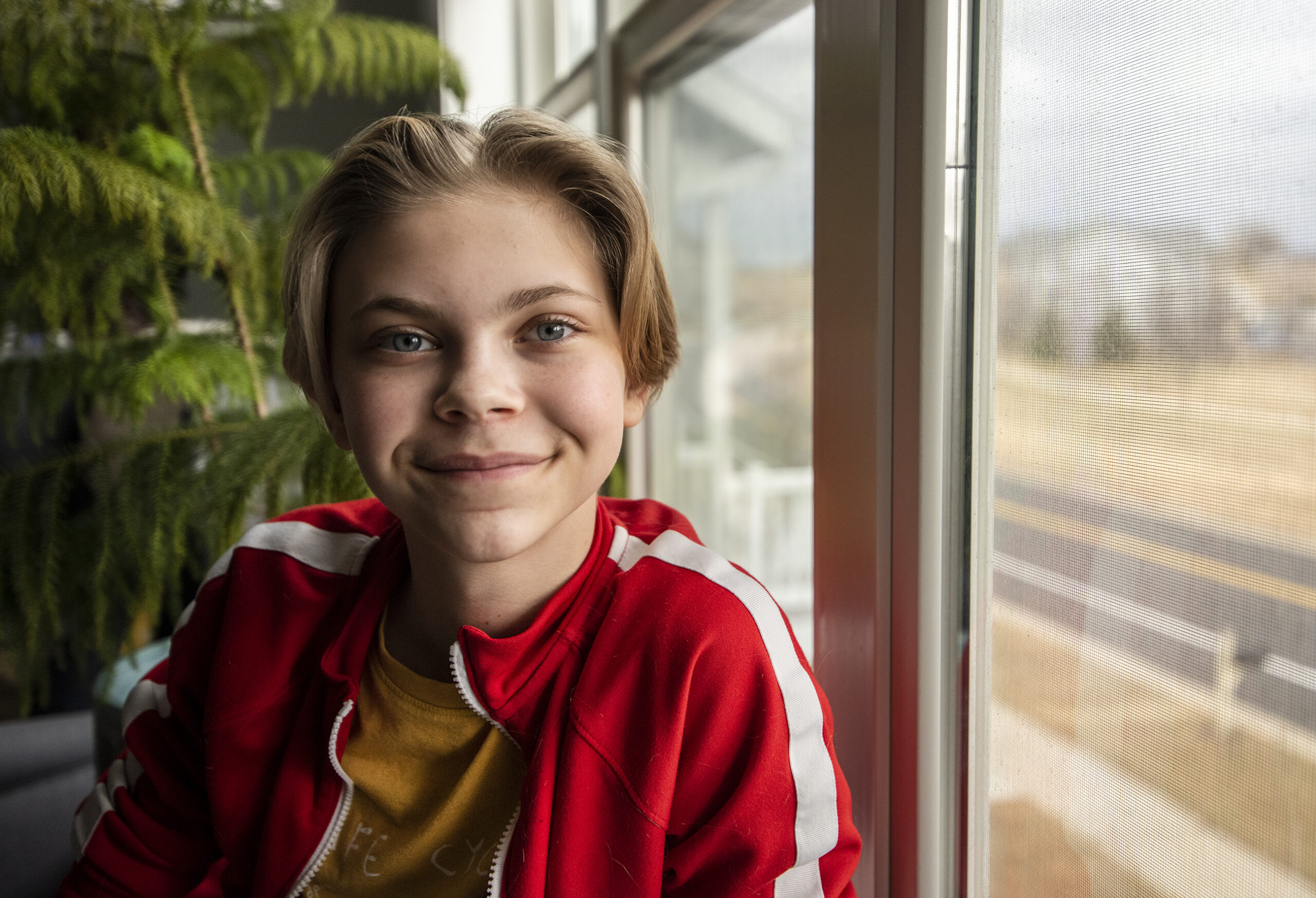
‘We’re just trying to live’
Republicans have said social transition, puberty blockers and hormone replacement is harmful. A January memo asking lawmakers to co-sponsor the bill banning gender-affirming care for children under age 18 said gender transition isn’t effective in treating gender dysphoria.
“Children are especially vulnerable and we must protect them and allow for their natural development,” the memo reads. “Time and experience has taught us that young people need to be fully grown to have the mental faculties to make such substantial decisions, and we have deemed it to be within the public interest to restrict parental discretion as well.”
Many major medical associations disagree with the memo’s assertions, oppose the rash of similar bills in state legislatures and agree that gender-affirming care is safe and medically necessary for the physical and mental health of transgender children.
“There’s no reason why … random strangers in the Legislature should be allowed to weigh in on that,” Megin McDonell, executive director of LGBT advocacy group Fair Wisconsin, said.
Wisconsin’s bills focused on trans youth are going nowhere for now. But they could be reintroduced next year, when split control of government is far from guaranteed. That makes Bailey nervous.
“If it were to be that these bills passed, and I can’t get the care that I need, then a physical part of who I am wouldn’t feel right,” Bailey said.
For now, Bailey’s trying to focus on finishing 10th grade and figuring out what he wants to do after graduation. He’s also looking ahead to that birthday drag show.
“We’re not trying to change the world or anything like that,” Bailey said. “We’re just trying to live just in the way that feels most comfortable for us to live.”
